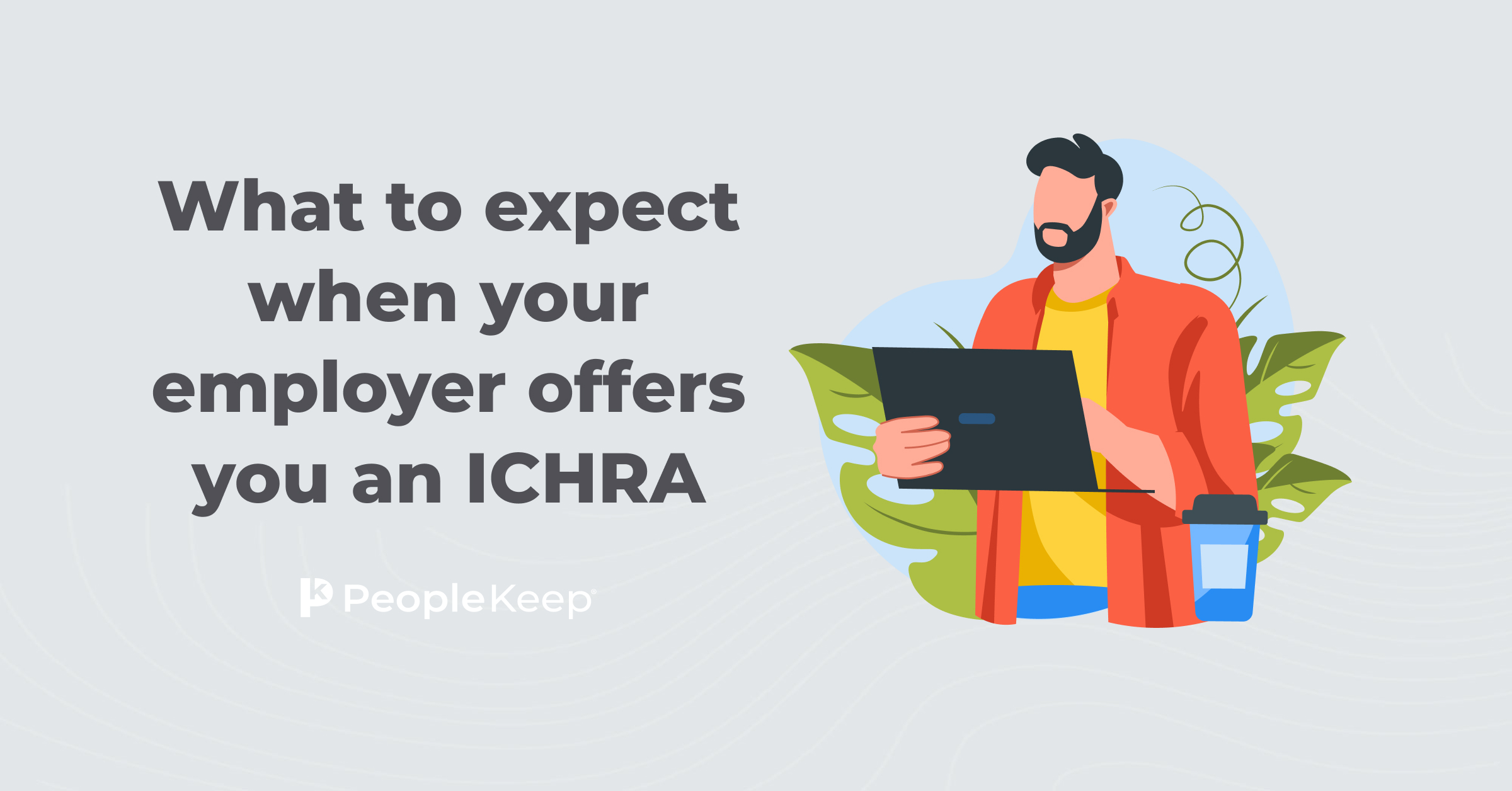The ICHRA notice: what are the requirements?
By Elizabeth Walker on April 17, 2023 at 1:26 PM
The Departments of the Treasury, Labor, and Health and Human Services require employers to follow specific regulations to offer their employees an individual coverage health reimbursement arrangement (ICHRA). One of the most important requirements is the ICHRA notice.
The ICHRA notice informs eligible employees about how an ICHRA works so they can decide whether they want to opt in or out of the benefit. It also explains how they can purchase individual health insurance coverage and navigate premium tax credits if they opt in to the ICHRA.Because the notice is critical to your employees’ understanding and participation in the ICHRA, you must ensure it contains all the necessary information. To get you started, this blog covers everything your ICHRA notice needs to include so you can offer your benefit compliantly.
Get everything you need to know about the ICHRA in our guide
What is an individual coverage HRA (ICHRA)?
Available to organizations of all sizes, ICHRAs allow employers to reimburse their employees for their individual health insurance premiums and qualified out-of-pocket medical expenses. Reimbursements are income-tax-free for employees and free of payroll taxes for employers.
The ICHRA works similarly to other HRAs. The employer sets a monthly allowance for each employee to purchase eligible healthcare items and services. After they confirm they have individual health insurance coverage, employees pay for eligible services and items. Once they submit proof of the expense and it’s approved, the employer reimburses them up to their allowance amount.
Unlike the qualified small employer HRA (QSEHRA), there are no maximum contribution limits on how much of an allowance you can give your employees. Additionally, you can determine eligibility based on 11 employee classes (depending on your benefits administrator software) and even set custom allowance amounts for participants in different classes.
When must the ICHRA notice be provided?
To ensure they have sufficient time to opt in or opt out of the ICHRA, eligible employees must generally receive a 90-day notice (or as much notice as possible) before the ICHRA’s plan year begins. You must provide the written notice every year you offer the ICHRA. For example, if your ICHRA’s plan year begins on January 1, it's a best practice to send employees the notice by October 3 of the previous year.
The ICHRA Final Rules state that the ICHRA "generally would be required to provide a written notice to each participant at least 90 days before the beginning of each plan year."
Sending notices well in advance of the benefit start date is better, but it isn't always possible. The regulations allow for some flexibility in timing. If you administer your ICHRA with PeopleKeep, we set a minimum 30-day notice for employees when establishing your ICHRA for the first time. You can also select the recommended 90-day notice.
The timing is different for newly eligible employees, such as new hires, and newly established organizations. You can provide the notice up until the first day the employee’s ICHRA coverage begins. However, it’s best to provide notice as soon as possible, so the employee can review medical coverage options and enroll in a plan during a special enrollment period.
Ten items your ICHRA notice must include
The Centers for Medicare & Medicaid Services (CMS) provides a template1 that you can use to draft your notice so that you don’t have to start from scratch. The federal government states that the model notice will keep you compliant if given within the correct time frame.
However, if you’re new to the ICHRA and you’re worried about making an error, you can leverage HRA benefit administrator software that will draft and send the notice to employees automatically, saving you time and hassle.
But to give you an idea of what the notice should include, check out the ten notice requirements below.
1. A basic description of the ICHRA
This section should describe the basic terms of the ICHRA and clarify that it isn’t any other type of HRA, like a QSEHRA or excepted benefit HRA (EBHRA). You must also outline the maximum allowance amount for each participant, which eligible family members are included in the benefit (if applicable), and whether the allowance varies based on family size or age.
If the allowance does vary based on family size, the notice should indicate the amount provided for each family status, as this amount will impact the participant’s benefit affordability calculations and premium tax credit eligibility.
You should also explain that participating in the ICHRA requires the employee and any dependents to enroll in and maintain coverage of an individual policy or Medicare. Short-term, limited-duration, or excepted benefits coverage, like a dental or vision plan, doesn’t meet this requirement.
Lastly, the notice must also explain how frequently you give the allowance, whether monthly or annually, the benefit’s effective date, when the plan year begins and ends, and what medical expenses are eligible for reimbursement.
2. A statement of the right to opt out of and waive future reimbursements
This informs employees that they can opt out of the benefit and details how and when they can opt out, thus waiving any future ICHRA reimbursements. This should also include when their HRA funds are forfeited if they leave your organization.
Generally, it’s best practice to have the employee submit in writing if they decide to opt out of the ICHRA.
3. A statement explaining how an employee can obtain individual health insurance
If an employee already has an individual health plan, they can keep their current policy and participate in the ICHRA. For employees that don’t have self-only coverage, this statement will need to inform them how they can get an eligible policy.
Employees looking to participate in the ICHRA can enroll in an individual policy through a state-based exchange or federal marketplace application. They can also use a private exchange, which is directly from an insurance company. Their monthly premium will vary based on their chosen plan.
If the ICHRA’s plan year is January 1, they’ll need to get a new individual health insurance plan or re-enroll in their current plan. If they have a Medicare policy, their medical coverage will generally roll over from year to year.
4. A statement explaining the substantiation process of individual health insurance
ICHRA participants must attest they have health plan coverage or Medicare to get reimbursed. This section should describe substantiation procedures, such as required documentation, who it should be sent to, and how frequently it should be provided.
This section should also explain that participants won’t be reimbursed for expenses incurred during any months they didn’t have appropriate coverage. They must update their benefit administrator if they terminate coverage during the plan year.
5. A statement on how the ICHRA will affect premium tax credit availability, whether the employee opts out or chooses to accept the benefit
The notice should explain the following regarding ICHRAs and premium tax credit eligibility:
- If an employee opts out of the ICHRA and the benefit is considered unaffordable, they may collect their premium tax credits if they’re eligible for any. This applies to any eligible dependents listed on the ICHRA benefit as well.
- If an employee opts out of the ICHRA and the benefit is considered affordable coverage, they can’t collect their premium tax credits if they’re eligible for any. This again applies to any eligible dependents listed on the ICHRA benefit.
6. A statement that the participant must inform any exchange to which they apply for an advanced premium tax credit of certain relevant information
This should notify the employee to disclose the basic terms of their ICHRA benefit and whether or not they’re a current or former employee when applying for individual health coverage on a public or private exchange. This allows the exchange to determine if they’re eligible for an advanced premium tax credit if they’ve applied for one.
7. A statement about the availability of a special enrollment period for employees and dependents who newly gain access to the HRA
If an employee’s ICHRA starts January 1, they need to enroll in self-only coverage within 60 days before the plan year starts, which is during the open enrollment period.
However, this statement should notify employees that they qualify for a special enrollment period if they become eligible for an ICHRA starting on other than January 1 or if they’re a new hire during the plan year.
If the ICHRA starts mid-year, participants have ample time to enroll in individual coverage. They’ll have up to 60 days before the first day that their ICHRA begins or up to 60 days after it begins.
Employees who enroll in coverage during this special enrollment period may need to show their exchange a copy of their ICHRA notice as proof of their qualifying life event.
8. A statement about how the participant can find assistance for determining their individual coverage HRA affordability
The notice should state that the marketplace provides information on how employees can determine their ICHRA’s affordability according to their state. If the employer has an HRA administrator, they have an affordability tool to help employees determine if they should opt in or out of the ICHRA.
9. A statement that the ICHRA can be integrated with Medicare
You must inform your employees that they can integrate Medicare with the ICHRA. The statement must also disclose that participants with Medicare are ineligible to receive premium tax credits. This is regardless of whether the ICHRA is affordable, provides minimum value, or if they opt out of the benefit.
10. Contact information of an individual or a group of individuals who participants can contact with questions regarding their ICHRA
The employer notice must include the contact information, including a phone number, of individuals or groups eligible employees may contact with questions about the ICHRA. The employer can determine who is best suited to help the participants.
Conclusion
ICHRAs are a flexible employee health benefit that gives your staff control over their healthcare. Because your employee may not be as familiar with an ICHRA as they are a group plan, it’s understandable that they may be confused about how the ICHRA works and what steps they need to take before they opt in to the benefit.
That’s why having a comprehensive ICHRA notice will put your employees in the best position to make the right decision for them and their families.
This article was originally published on September 3, 2019. It was last updated on April 17, 2023.
Check out more resources
See these related articles

15 individual coverage HRA (ICHRA) FAQs
If you’re new to ICHRAs, don’t worry! This blog answers 15 FAQs employers have about ICHRAs to help you understand how it can benefit your employees.

What to expect when your employer offers you an ICHRA
Curious about ICHRAs? Discover what to expect when your employer offers you an individual coverage health reimbursement arrangement with this guide.

Guide to mid-year plan changes
Can you change your health insurance plan mid-year? This guide explains when it's allowed, what qualifies, and how to navigate mid-year changes.


